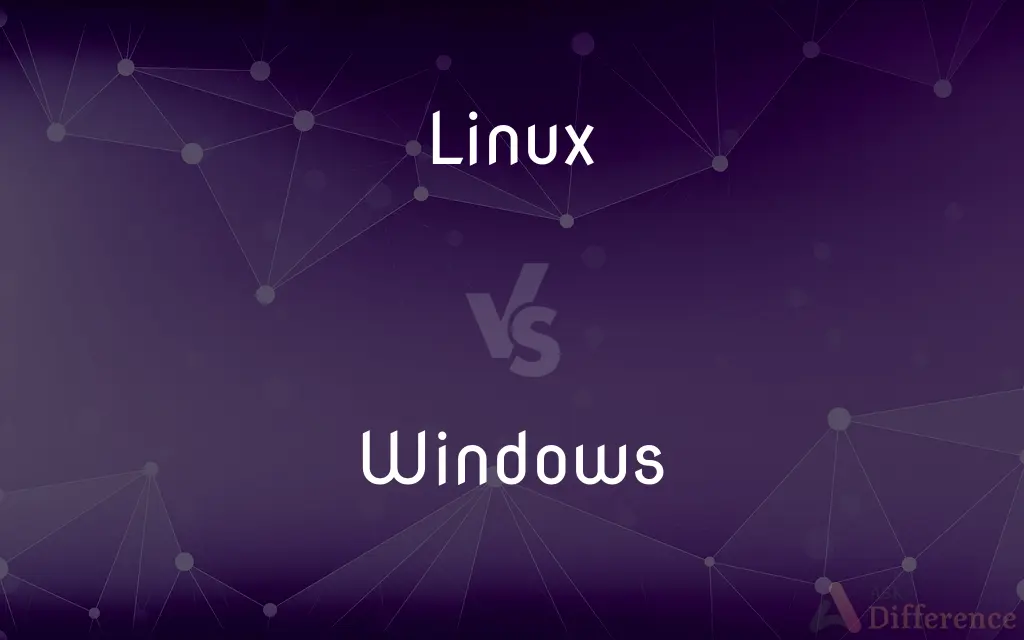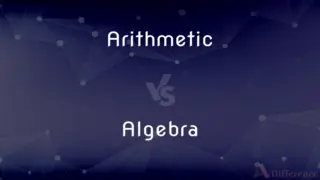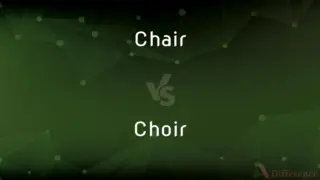Linux vs. Windows — What's the Difference?
By Tayyaba Rehman — Updated on September 22, 2023
Linux is an open-source, Unix-like OS, while Windows is a proprietary OS by Microsoft. Both have unique ecosystems, user experiences, and application compatibilities.

Difference Between Linux and Windows
Table of Contents
ADVERTISEMENT
Key Differences
Linux and Windows stand as two of the most recognizable operating systems in the computing world. Linux, originally developed by Linus Torvalds, is an open-source, Unix-like operating system. This means its source code is freely available and can be modified by anyone, fostering a large community-driven development. Windows, developed by Microsoft, is a proprietary operating system, meaning its source code isn't publicly accessible.
The user experience between Linux and Windows varies considerably. Linux is known for its customization capabilities. With multiple distributions available, such as Ubuntu, Fedora, and Debian, users can choose an environment that best suits their needs. Windows, on the other hand, offers a more standardized interface, with versions like Windows 10 or Windows 11 providing consistent user experiences across devices.
In terms of application compatibility, Linux traditionally leans towards server environments and development tasks, supported by a vast repository of open-source applications. Windows, being more mainstream, boasts a vast array of commercial software and games, often making it a preferred choice for business and personal use.
Cost and licensing present another distinction. Being open-source, Linux is generally free, though some enterprise versions might come with a fee for support. Windows, being proprietary, often requires a license purchase, especially for business editions.
Lastly, the support structures differ. Linux, being community-driven, has a vast online presence with forums and user groups dedicated to troubleshooting and sharing knowledge. Windows users, while also having community support, can access formal support channels through Microsoft.
ADVERTISEMENT
Comparison Chart
Development Model
Open-source
Proprietary
User Experience
Highly customizable with various distributions
Standardized across versions
Application Compatibility
Favors open-source apps & servers
Wide range of commercial software & games
Cost
Generally free (with some paid versions)
Requires a license (cost varies)
Support
Community-driven with online forums
Community and official Microsoft support channels
Compare with Definitions
Linux
Often used in server and development environments.
The company's web server runs on a Linux machine for stability.
Windows
A proprietary operating system by Microsoft.
My new laptop came pre-installed with Windows 11.
Linux
Developed originally by Linus Torvalds.
The inception of Linux was a turning point in open-source software history.
Windows
Offers a wide array of commercial software and games.
She bought Windows specifically to play the latest video games.
Linux
Benefits from a vast, community-driven support system.
When I faced an issue with Linux, the online community was quick to help.
Windows
Known for its user-friendly and consistent interface.
Many businesses prefer Windows for its intuitive design.
Linux
An open-source, Unix-like operating system.
I installed Linux on my old laptop to rejuvenate its performance.
Windows
Has versions like Windows 10, 11, etc.
After the update, he transitioned from Windows 7 to Windows 10.
Linux
Known for its customizable distributions.
He preferred the Ubuntu flavor of Linux for its user-friendly interface.
Windows
Provides official support channels through Microsoft.
When I had a software glitch, I reached out to Windows' customer support.
Linux
Linux ( (listen) LEEN-uuks or LIN-uuks) is a family of open-source Unix-like operating systems based on the Linux kernel, an operating system kernel first released on September 17, 1991, by Linus Torvalds. Linux is typically packaged in a Linux distribution.
Windows
A GUI operating system for personal computers.
Linux
An open-source operating system modelled on UNIX.
Windows
Plural of window
Linux
(software) Any unix-like operating system that uses the Linux kernel.
Linux
An open-source version of the UNIX operating system
Common Curiosities
Is Linux free to use?
Generally, yes. Most Linux distributions are free, though some enterprise versions may charge for support.
Who developed Windows?
Windows was developed by Microsoft.
How many Linux distributions are there?
There are hundreds of Linux distributions, including Ubuntu, Fedora, and Debian.
Can I run Windows applications on Linux?
With tools like Wine or Proton, some Windows applications can be run on Linux, but compatibility isn't guaranteed.
What are popular versions of Windows?
Popular versions include Windows 7, 10, and 11.
Is Windows open-source like Linux?
No, Windows is a proprietary operating system.
Which operating system is more secure, Linux or Windows?
Both can be secure if properly configured, but Linux often has a reputation for better security due to its open-source nature.
Are updates in Linux mandatory like some Windows updates?
Linux updates are at the discretion of the user and aren't forced.
How is software generally installed on Linux?
Software on Linux is often installed through package managers or repositories, though manual installations are also possible.
Can I customize Windows like Linux?
Linux offers deeper customization compared to Windows, though Windows does offer personalization features.
Do I need antivirus software on Linux like on Windows?
While Linux is less targeted by malware than Windows, having security measures is still recommended.
Share Your Discovery

Previous Comparison
Arithmetic vs. Algebra
Next Comparison
Chair vs. ChoirAuthor Spotlight
Written by
Tayyaba RehmanTayyaba Rehman is a distinguished writer, currently serving as a primary contributor to askdifference.com. As a researcher in semantics and etymology, Tayyaba's passion for the complexity of languages and their distinctions has found a perfect home on the platform. Tayyaba delves into the intricacies of language, distinguishing between commonly confused words and phrases, thereby providing clarity for readers worldwide.
















































